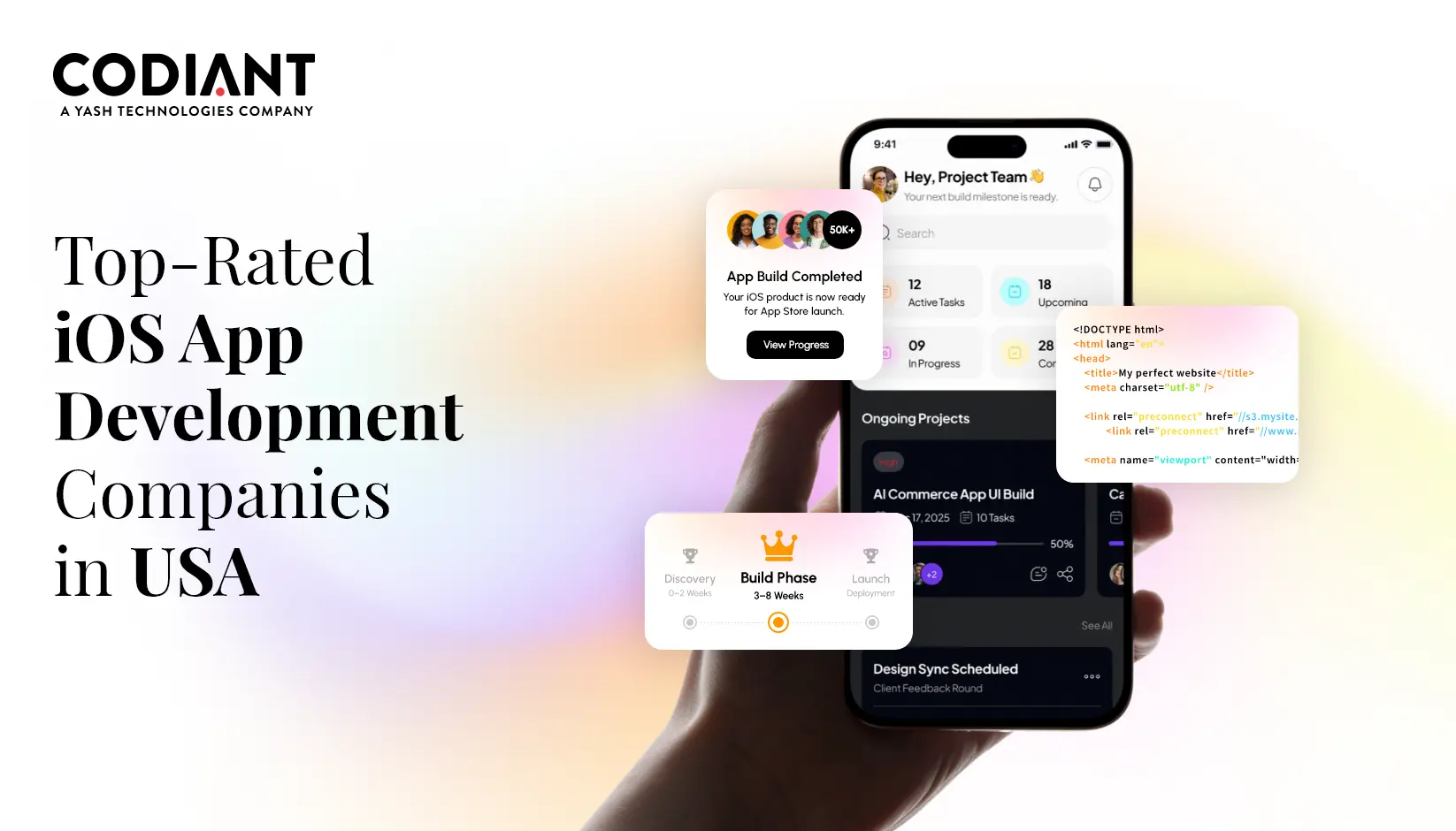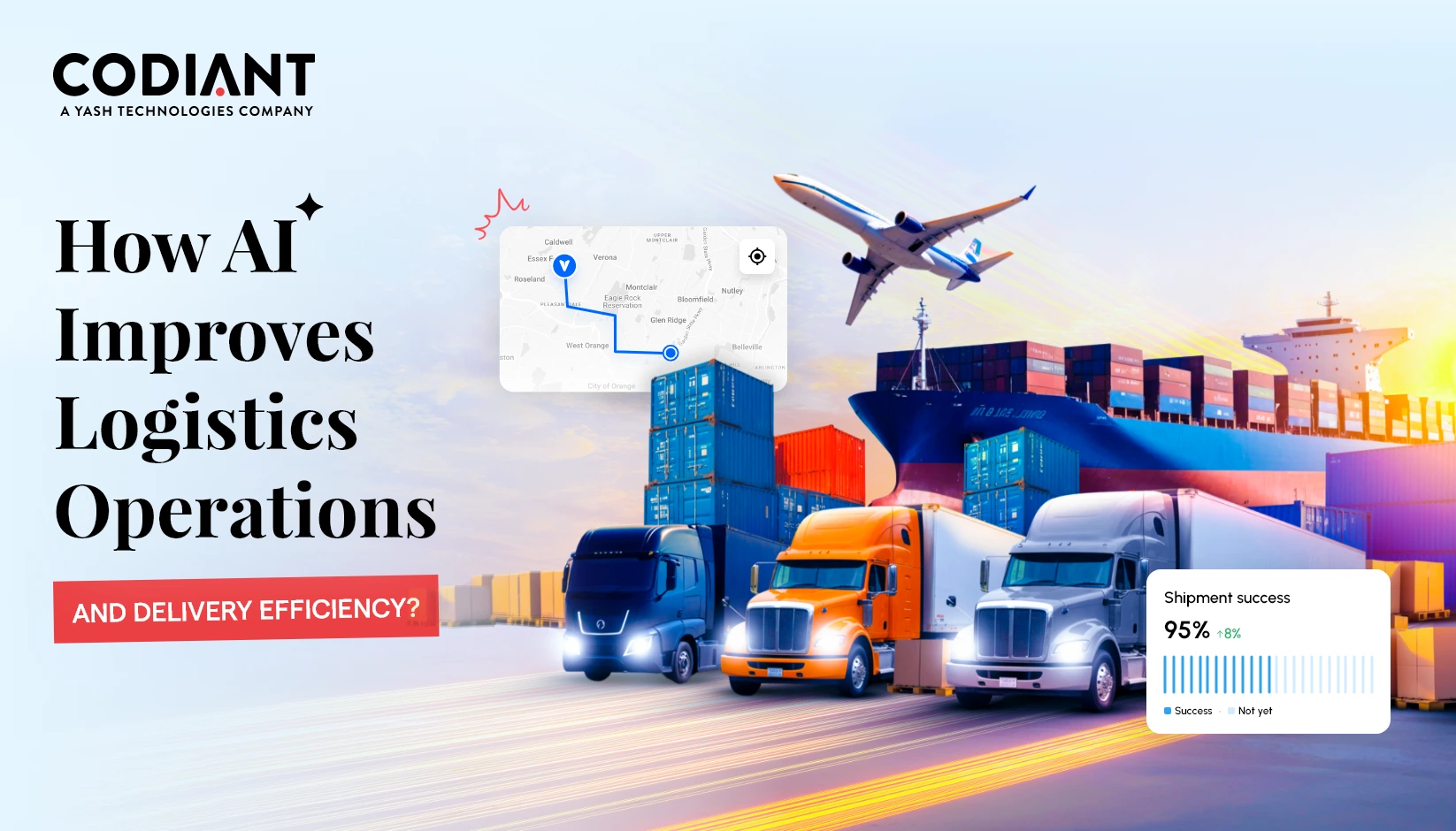How AI is Revolutionizing the Automotive Industry
Table of Contents
Subscribe To Our Newsletter

Automotive industry is powered by AI technology! From industrial robots and advanced safety systems to self-driving cars, AI is making innovations in automobiles that were once thought impossible. The development of AI in vehicle manufacturing has transformed the way cars are created and driven while also building good opportunities for both manufacturers and clienteles.
With AI, cars are now smarter, safer, and more efficient. AI helps predict maintenance requirements and tailor experiences inside the car for a smoother ride.
This is why top automobile leaders are trying to embed Artificial Intelligence in cars and other vehicles while working to improve customer experiences.
- Waymo (Alphabet Inc.): Leading the Autonomous Driving Revolution
- Tesla Inc.: Pioneering AI-Powered Autopilot for Smarter Driving
- BMW AG: Enhancing Vehicles with AI for Efficiency & Performance
- NVIDIA Corporation: Powering Safer Autonomous Vehicles with AI
- Intel Corporation: Advancing AI for Smarter and Safer Driving
76% of automotive companies are already utilizing AI and machine learning technologies.
Don’t fall behind—harness AI to drive your automotive business forward.
Role of AI in Smart Vehicles
Think of a car that doesn’t just take you from one location to another but understands, predicts, responds for transforming every journey into a stress-free experience.
That’s exactly what AI does in smart vehicles! The road ahead is intelligent and it creates a smarter and more connected future. AI not only improves cars; It revolutionizes the entire driving experience and redefines mobility. From self -driving technology to predictive maintenance, AI transforms how we drive.
Have you ever wondered how modern cars notify you before an accident or adjust routes based on real -time traffic? It’s AI in action! Advanced driver assistance systems (ADAS) use AI to detect obstacles, prevent collisions and even help with parking. AI-driven voting assistants customize your experience in the car, adjust climate settings, play your favorite music and offer hand-free navigation.
And it doesn’t stop there – AI in automotive makes vehicles more efficient. Here is how:
- Predictive analysis helps detect engine problems before they become expensive repairs.
- AI-driven traffic control reduces overload, cutting down travel time and emissions.
- With completely autonomous cars on the horizon, AI for autonomous driving is prepared.
AI-Powered Automotive Industry Insights
AI in cars is growing fast – from $2.5Bn (2019) to $74.5Bn (2030).

Usecases of AI in Automotive Sector
AI is widely used in the automotive industry, from design and manufacturing to sales and maintenance. It plays a role in every stage of a vehicle’s life cycle, which is why leading car brands are adopting AI to enhance their vehicles.

Autonomous Driving
AI assists developing self-driving cars by using machine learning, computer vision, and data processing. These smart vehicles rely on cameras, LiDAR sensors, and radar to detect objects, read road signs, and predict pedestrian activities. AI makes driving safer, decreases traffic congestion, and reduces human errors, leading to smoother and more efficient transportation.
Advanced Driver Assistance Systems (ADAS)
Leveraging Artificial Intelligence, ADAS can effortlessly enhance vehicles’ safety. It includes features such as Automatic Emergency Braking (AEB), Lane Departure Alerts, Adaptive Cruise Control, and Blinder monitoring. These systems continuously analyze real-time driving conditions, offer alerts on time and take helpful measures to prevent collisions, aiding drivers stay safe along the way.
Predictive Maintenance
AI monitors vehicle performance using real-time sensor data and onboard diagnostics. It detects early signs of wear in engines, brakes, and other critical parts. By predicting maintenance needs, AI helps prevent breakdowns, reduce repair costs, optimize efficiency, extend vehicle lifespan, and ensure smooth, reliable operation for owners and fleet managers.
Smart Manufacturing and Quality Control
AI-driven automation revolutionizes vehicle production by optimizing production processes. AI-driven robots perform tasks such as welding, mounting of parts and painting with high precision and accuracy. AI-based quality control systems use image recognition to detect real-time errors and ensure that only top-quality vehicles reach the market. This leads to increased efficiency, reduced production costs and fewer recalls.
Connected Vehicles & IoT Integration
AI allows cars to keep in touch via the Internet of Things (IoT), so that vehicles can communicate with each other (V2V), infrastructure (V2I) and sky craft systems. This connection supports external software updates, real-time traffic alerts and predictive analysis for better route planning. AI also improves fleet management by tracking vehicle conditions, optimizing fuel use and improving general efficiency.
Personalized In-Car Experience
AI-driven in-car entertainment and assistance systems offer a smarter and a more personalized driving experience. Virtual assistants powered by AI understand natural language, respond to voice commands, and help with tasks such as navigation, music choices, and climate control. These systems adapt to user preferences, provide recommendations, and create a seamless, pleasant, and hands-free driving experience.
Supply Chain & Logistics Optimization
AI helps car manufacturers to streamline control of the supply chain by predicting demand, optimizing the storage level and improving logistics. AI algorithms analyze market trends, supplier performance and real-time production data to prevent overstay or deficiency. This leads to reduced delays, lower costs and a more efficient production process, which ensures timely vehicle production and delivery.
Did You Know?
Every year, 50% of rear-end collisions could be avoided with AI-driven ADAS, and 90% of traffic accidents could be prevented by autonomous systems. Yet, millions of vehicles still lack these life-saving innovations.
1. What if your app could enable predictive maintenance, reducing vehicle downtime by 50%?
2. What if AI-powered personalization boosted customer satisfaction by 25%?
The road ahead is AI-powered—let’s build the future of smart, safe, and efficient automobiles together.
Advantages of AI in Automotive
The automotive industry is using Artificial Intelligence to improve effici0065ncy and vehicle performance. With technologies like big data, IoT, and machine learning, AI is changing how cars are designed, built, and operated.

Let’s have a look at the advantages of integrating AI in automobiles.
Improve Traffic Safety
AI makes the roads safer by operating advanced security features such as Lane Departure Warning (LDW), Autonomous Emergency Braking (AEB) and Adaptive Cruise Control (ACC). These systems help drivers discover dangers, take the right action and prevent accidents.
Track Vehicles in Real Time
AI and IoT help the automotive industry with predictive maintenance by tracing real -time vehicle conditions. Sensors detect potential problems and alert leaders before becoming serious problems. AI also improves fuel efficiency, reduces emissions and improves the general vehicle’s performance.
Reduce Total Expenses
Car manufacturers use artificial intelligence to cut costs and improve efficiency. Automation in the automotive industry reduces labor and errors, AI manages inventory, and robots accelerate production. AI also detects problems early, lowers repair costs and makes them more sustainable.
Improve Driver’s Experience
AI-driven infotainment systems make driving easier and more fun. Voice assistants help with music, navigation, temperature control and hand-free conversations. They improve convenience, safety and create a personal driving experience.
Optimize Production Process
AI improves production by automating tasks, reducing errors and increasing efficiency. It monitors production in real time, predicts maintenance needs and ensures quality control. AI-driven robots work with precision, while data analysis streamlines supply chains and cut waste. This results in faster production, lower costs and better-quality vehicles.
Read More: How to Build a Logistics and Transportation App Like Aramex?
Best AI applications in automotive Industry
Artificial Intelligence is revolutionizing how vehicles operate, improve safety, enhance driver experience, and optimize efficiency across various processes. Explore the table below to discover the best AI applications in the automotive industry.
| S No | AI Application in Automotive | Description |
| 1 | Self-Driving Cars | Enables vehicles to drive and make decisions on their own, improving autonomy |
| 2 | Predictive Maintenance | Detects vehicle issues early to prevent breakdowns and minimize repair costs |
| 3 | Traffic Control | Advances traffic flow, reduces congestion, and improves road safety |
| 4 | Driver Support | Comes with safety features such as lane-keeping, collision avoidance, and cruise control |
| 5 | Voice Assistants | Allows voice control for various in-car functions, making driving more convenient |
| 6 | Vehicle Design | Enhances vehicle design and efficiency through advanced simulations and testing |
| 7 | Personalized Settings | Adjusts vehicle settings such as seat position and climate based on driver preferences |
| 8 | Supply Chain | Manages inventory, predicts demand, and ensures timely delivery of car parts |
| 9 | Performance Adjustment | Optimizes vehicle performance by adjusting settings for fuel efficiency and power |
| 10 | Self-Parking | Parks the vehicle, detecting available spaces online and obstacles |
| 11 | Better Navigation | Improves navigation by analyzing real-time traffic and road conditions |
| 12 | Driver Behavior Monitoring | Tracks and analyzes driving habits to ensure safety and provide feedback for improvement |
| 13 | Smart Headlights | Adjusts headlights for optimal visibility and road safety based on driving conditions |
| 14 | Fleet Management | Tracks and handles vehicle fleets efficiently, enhancing operational efficacy |
| 15 | Vehicle-to-Everything (V2X) | Enables communication between vehicles, infrastructure, and walkers to increase safety |
| 16 | Automated Toll Collection | Processes automatically toll payments by recognizing vehicles without the need for stopping |
| 17 | Smart Parking Solutions | Uses sensors and AI to find and manage parking spaces efficiently |
| 18 | Insurance Risk Assessment | Analyzes driving behavior to assess insurance premiums and reduce fraud |
| 19 | Vehicle Diagnostics | Uses sensors and AI to diagnose vehicle issues and suggest repairs |
| 20 | AR Dashboards | Provides real-time information and navigation overlay on the windshield for better driving experience |
How Codiant Can Help Automotive Startups Gear Towards AI-Powered Autonomous Vehicles?
Codiant, a digital transformation company, offers a range of specialized services designed to drive automotive startups into the land of AI-driven autonomous vehicles. Leveraging our extensive expertise in AI and autonomous systems, we assist automotive startups in the following ways:
1. Generative AI Development Services:
Codiant provides tailored AI app development services that align with the specific needs and objectives of each automotive AI startup. This ensures a seamless integration of AI technologies into their vehicles.
2. End-to-End Development Support:
We offer comprehensive support throughout the development lifecycle, from ideation to deployment. This includes feasibility studies, prototyping, algorithm development, and testing.
3. Regulatory Compliance and Safety Standards:
Codiant is well-versed in the regulatory landscape of autonomous vehicles. We help startups navigate compliance requirements and ensure that their vehicles meet the highest safety standards.
4. Data Security and Privacy:
With an emphasis on data security, we implement robust measures to safeguard sensitive information, a critical aspect of autonomous vehicle technology.
5. Machine Learning and Computer Vision Expertise:
Our team possesses extensive knowledge in machine learning and computer vision, essential technologies for building reliable and intelligent autonomous systems.
6. Integration with Existing Systems:
We ensure that AI-driven autonomous capabilities seamlessly integrate with existing automotive systems, providing a smooth transition towards autonomous functionality.
7. Prototyping and Testing:
We have an expert hand in assisting startups in creating prototypes and conducting rigorous testing to validate the performance and safety of their AI-driven autonomous vehicle systems.
No matter as an automotive startup what your project requirements are, you can confidently venture into the development of AI-powered autonomous vehicles, knowing you have a reliable technology partner with you.
In A Nutshell
In the world of cars, AI is like a futuristic wizard transforming everything. It’s making our vehicles safer, smarter, and more connected than we ever dreamed. Picture it as a super brain in your car, making it drive better, stay healthy, and even easier to build.
Whether you’re a tech-savvy millennial or just someone curious about where cars are headed, AI is changing the game in transportation. So, buckle up and prepare for the AI revolution in the auto industry. The future is here, and it’s steering us toward a safer, more efficient, and connected world.
Frequently Asked Questions
AI is changing the automotive industry by enabling self-driving cars, improving safety, and streamlining manufacturing. It enhances predictive maintenance, automates production, and personalizes in-car experiences. AI-powered analytics also optimize supply chains, boost fuel efficiency, and improve vehicle performance, making transportation safer, smarter, and more efficient than ever.
AI is making cars safer, more efficient, and cost-effective. It powers autonomous driving, predictive maintenance, and smart manufacturing. AI-driven systems help manage traffic, reduce emissions, and provide real-time data for better decision-making. These advancements benefit manufacturers and consumers, leading to better performance, lower costs, and an improved driving experience.
AI will shape the future of the automotive industry with fully autonomous vehicles, advanced traffic management, and smarter connectivity. Predictive maintenance will make cars more reliable, while AI-powered infotainment systems will enhance user experience. AI will also support sustainable mobility, reducing environmental impact while improving road safety and efficiency.
Predictive maintenance uses AI and IoT to monitor vehicle health in real time. AI analyzes sensor data to detect early signs of wear in engines, brakes, and other parts. This helps prevent breakdowns, lowers repair costs, extends vehicle lifespan, and ensures smooth operation for both car owners and fleet managers.
AI enhances vehicle manufacturing by automating production, reducing defects, and increasing efficiency. AI-powered robots handle tasks like welding and painting, while machine learning detects quality issues. AI also optimizes supply chains, minimizes waste, and lowers costs, ensuring faster production and high-quality vehicles in the market.
Featured Blogs
Read our thoughts and insights on the latest tech and business trends
Top iPhone App Development Companies in USA in 2026
- February 18, 2026
- Mobile App Development
In a Nutshell The USA remains one of the strongest hubs for premium iPhone app development in 2026, especially for fintech, healthcare, retail, and SaaS brands. Choosing the right iOS partner goes beyond portfolios; the... Read more
How to Choose the Right AI Development Partner in the USA (Enterprise Guide 2026)
- February 12, 2026
- Artificial Intelligence
In a Nutshell Enterprise AI success starts with clear business goals, not vague plans like “we need AI.” The best AI development partners deliver real production systems, not just impressive demos or prototypes. Industry alignment... Read more
How AI Is Transforming Transport & Logistics Operations in Real Time
- February 10, 2026
- Artificial Intelligence Logistics & Transportation
In a Nutshell: AI in transport & logistics is enabling faster, smarter decision-making across fleets, warehouses, and supply chains. Real-time logistics optimization improves route planning, dispatching, and delivery efficiency as conditions change. AI-driven forecasting and... Read more




